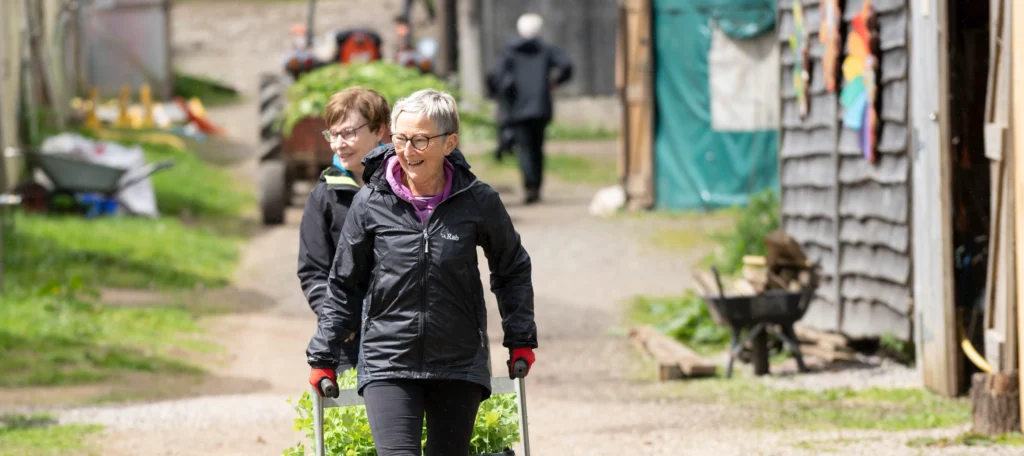
The scientific evidence is there to show that being outdoors is good for physical and mental health, but could growing things actually provide an even bigger boost? The answer from one Cumbrian mental health project is ‘yes’.
When the Growing Well charity was created, 20 years ago this year, it was ground breaking – in more ways than one.
The idea came from James Smith, a community gardens expert, and Beren Aldridge, a psychotherapist. They wanted to create an organisation which combined organic gardening with mental health therapy.
The pair were given the opportunity to use six acres of land on the outskirts of Kendal at Low Sizergh Farm, part of the National Trust’s Sizergh estate, and they became tenants of the Park family’s organic dairy farm.
The project has grown substantially – if you’ll pardon the pun – with two new sites now open, one in Tebay in the north of the county, and another in Egremont, near Cumbria’s coast. Now the team is aiming to replicate Growing Well’s therapeutic model across the UK.
The charity’s chief executive Mary Smith says the initiative is unique because, unlike other similar outdoor therapy sites, it has the data to show that it works.
“We keep a keen eye on things being done safely and properly and are hoping to ensure some kind of professional standard can be applied,” she says. “At the moment, anyone in the world can open a field and call it a mental health charity with no background or training.”
So, if getting out in the fresh air is good for us, why does adding gardening to the mix make it better?
“There are tangible results to what you’re doing,” says Mary, “and that helps with the building blocks of better mental health. They can involve really basic things, like being outside, connecting with other people, doing physical activity and, most importantly, feeling like you have a purpose.
“When you are growing something, you know your husbandry of that seedling or that plant or crop is your responsibility – and when it works, you are able to see that whole cycle through. Sometimes it fails but, most often, if you plant something in the soil it yields something wonderful.
“It’s something that’s bigger than yourself.”

The Growing Well website says ‘our work improves the health of the landscape and the population’ and that’s increasingly true. Hundreds of people each year benefit from this therapy, and it is now a fully commercial operation and the biggest organic vegetable producer in Cumbria. The ingredients it grows are on the menus of Michelin-starred restaurants and the famed Westmorland Group motorway service stations, as well as being sold to local residents in veg boxes.
The good news is you don’t need a share in a country estate to feel the horticultural benefits. Even a few pots on a city centre balcony could have a positive impact. Peer-reviewed academic journals have carried reports of how growing things as a hobby can lead to lower levels of depression and anxiety, while moving to a greener area can have lasting effects on mental health, even after you’ve moved back into an urban setting.
There are undoubtedly physical benefits as weeding and hoeing burns calories as aerobic activity, while planting seedlings or pruning crops is good for manual dexterity. Brain chemistry alters as serotonin and cortisol are released, helping mood and emotions. The routines of the seasons calm the mind and give focus.
The Low Sizergh Farm in numbers
15
tonnes a year of produce
150
varieties
120,000
seedlings per year
4,000
crop shares per year
1,800
volunteer days worked
100,000
litres of recycled water used
A Royal College of Physicians report says there could be even wider benefits too: “There is increasing evidence that exposure to plants and green space, and particularly to gardening, is beneficial to mental and physical health, and so could reduce the pressure on NHS services. Health professionals should therefore encourage their patients to make use of green space and to work in gardens, and should pressure local authorities to increase open spaces and the number of trees, thus also helping to counteract air pollution and climate change.”
So committed are Growing Well to the restorative benefits of horticulture on wellbeing overall, they even offer ‘Give and Grow’ days to businesses as an alternative to a stuffy boardroom. To ‘cultivate a healthier team’, companies can book days at Westmorland Group properties for meetings, eating healthy lunches made from the homegrown produce, and getting their hands dirty tending the Tebay crops.
Mary also says, though Growing Well primarily helps people with very complex mental health issues, its seasonal routines and therapeutic philosophies aid its regular clients, as well as those who drop in on its Friday community days which are open to all.
“It works for anyone, and that’s the beauty of it,” she adds. “It works at whatever level you are feeling anxious, or mentally unwell, whether you are stressed out in your job, or have gone through a divorce or had a bereavement. There is no-one that mental ill health can’t reach.
“We’re seeing a lot of people with four day working weeks and taking that day to come and do something productive and positive, to give back and make you feel great in the process.”


